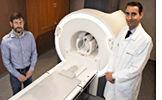Research & Development
Team uses MRI to study impact of COVID on brain
June 10, 2020
 HALIFAX – Researchers at the QEII Health Sciences Centre in Halifax are working to expose the connection between the brain and COVID-19. By using the experimental Synaptive Evry MRI for imaging the heads of patients, the team can examine how COVID-19 may be affecting the brains of patients who are sickened by the disease.
HALIFAX – Researchers at the QEII Health Sciences Centre in Halifax are working to expose the connection between the brain and COVID-19. By using the experimental Synaptive Evry MRI for imaging the heads of patients, the team can examine how COVID-19 may be affecting the brains of patients who are sickened by the disease.
“What we are doing is looking at imaging the brains of people who are hospitalized with COVID,” said Dr. Steven Beyea (pictured on left), a professor in Dalhousie’s department of diagnostic radiology and scientific director of the biomedical translational imaging centre at the QEII and IWK Health Centre in Halifax. “Is there an association between those patients who are hospitalized and are able to recover, versus those patients who are hospitalized and need additional critical care support?”
Dr. David Volders (pictured on right), a neuroradiologist at the QEII, says the MRI machine they are using has several advantages compared to other scanners used around the world.
“It’s smaller and easier to clean, which means we can move patients in and out much quicker and more efficiently,” said Volders. “We can look at specific parts of the brain in more detail and understand the disease better. Because, up until now, we know that COVID-19 affects the brain, but we don’t really understand how it does that.”
The 0.5T scanner is unique in the world – designed for imaging the head, and located in the ER department. It’s said to produce a more detailed image of brain structure than standard MRIs, especially in the part of the brain that controls the respiratory system.
And unlike most MRI scanners, it can accommodate patients with pacemakers or other metal implants.
In other studies, brain scans have turned up neurological effects in 15 to 25 percent of people who end up in intensive care with COVID-19, said Dr. Volders. In Halifax, Dr. Volders and Dr. Beyea hope to scan 60 patients for their study.
The COVID-19 research taking place at the QEII is unlike any other, according to Beyea. “The research we’re doing with these patients is going to be unique globally and, in part, driven by this novel technology from Synaptive Medical,” said Beyea.
“This new MRI – which is not just the first-of-its-kind in Nova Scotia, not even the first-of-its-kind in Canada, but the first-of-its-kind in the world – this is what’s going to allow us to do a study that would be difficult to do at hospitals elsewhere around the world, and is going to let us lead within this particular area.”
Volders says their research is one part of a puzzle that can help target COVID-19 treatment. “The ultimate goal is to have a vaccine that can cure patients and prevent patients from getting sick,” he said. “In the meantime, we need to be sure that we can get a better sense of what this disease is doing so we can target our resources and our treatment in a very specific way.”
